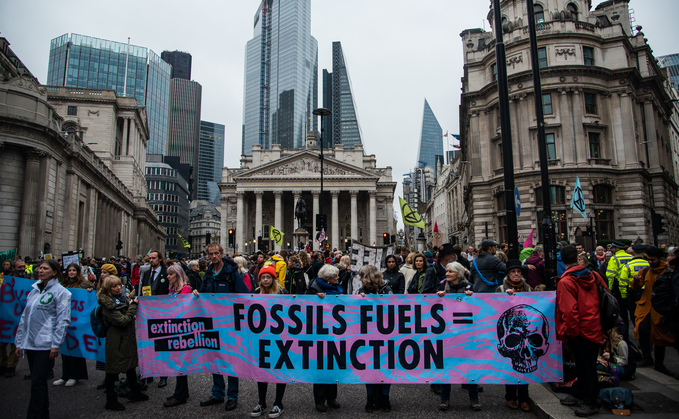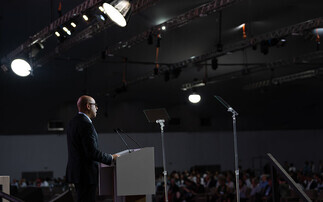
The debate around Labour's proposal to halt oil and gas licenses has become fundamentally unserious - investors and the public deserve better
The row surrounding Labour's plans to halt new oil and gas licenses and ramp up investment in low carbon infrastructure has now reached such levels of political spin that someone should probably try to harness it to drill deep into the Earth's core - in pursuit of geothermal energy, obvs.
The latest gambit from the government came in the form of a story in the Daily Mail suggesting that Labour's plans to borrow to invest in green infrastructure would increase mortgage payments by £1,000 a year. "When Labour are allowing Just Stop Oil and Extinction Rebellion to author their policies is it any wonder that their plan is a disaster," thundered Grant Shapps, the current Energy Security and Net Zero Secretary, who - and this seems relevant if we're talking about mortgage payments - also served, albeit belatedly, in Liz Truss' ill-fated government.
"Labour will force your family's costs up by £1,000 just to keep these anarchist eco-activists on side," he added.
To which the only rational response is: 'Have you seen what has happened to inflation and mortgage payments under the last three Cabinets in which you served, because if not you are in for one hell of a shock. Come back to us when you haven't played a role in successive governments that have overseen the worst wage growth and productivity gains in literal centuries.'
This is, of course, just the start of the hypocrisy. Does the government really want to pull at the thread that implies political donations lead inexorably to formal policy positions? Because the Conservative Party boasts a veritable cupboard full of extremely lavish such threads, provided through the generosity of various people with links to Russian oligarchs and fossil fuel companies.
In many ways, this is all good knockabout pre-election fun of the type we can expect a lot more of in the coming months. Labour will inevitably contest the analysis that suggests borrowing to invest in green infrastructure will inevitably lead to a major hike in interest rates, just as it is at pains to point out that Shadow Chancellor Rachel Reeves' fiscal rules remain firmly in place. The Tories will continue to argue Keir Starmer is in the pocket of a bunch of lentil-munching extremists who want the entire country to turn off their heating and erect a yurt in the garden. The whole picture is complicated further by the fact that some trade unions and Blairite ultra factions within Labour are siding with the government on this issue.
Meanwhile, NHS waiting lists will continue to stretch round the block, inflation will remain at eye-watering levels, and the White House will continue to woo global investors.
But there is a potentially significant problem here for the green economy in the fundamentally unserious way the government is now launching scattergun attacks on decarbonisation policies.
It is perfectly legitimate to question the wisdom of Labour's plans. If the Opposition wants to be seen as a government in waiting then it is right and proper that political opponents challenge the fiscal responsibility of its investment plans and interrogate the energy security implications of its proposal to halt new oil and gas development.
But if Ministers are going to accuse Labour of caving to Just Stop Oil's demands or pursuing a 'disaster' of an energy strategy then it is beholden on them to explain, in detail, what is so insane about the Opposition following the advice of the International Energy Agency (IEA). It is surely pertinent that Labour's position is not in reality that extreme. It is less a response to Just Stop Oil's demands and more a response to those other notorious anti-establishment figures: the executive director of the IEA, the Secretary General of the UN, and the Conservative chair of the Climate Change Committee, all of whom maintain new fossil fuel projects are incompatible with limiting warming to 1.5C.
If there really is a political consensus on the need to reach net zero by 2050, then the responsible thing for the Conservatives to do is set out why their strategy - which lest we forget insists that continued coal, oil, and gas development is somehow compatible with deep decarbonisation - is credible and superior to Labour's plan.
If there is a plan to use carbon capture technologies and carbon removals to compensate for the emissions from new oil and gas fields, not to mention coal mines, then could we see it? If the government has privately conceded the 1.5C temperature target is no longer plausible, could we be told? If there is a way to convince other economies not to exploit their new oil and gas fields while we fire up the drilling rigs, could it be explained? Because otherwise people might assume it is the government's plan that is "a disaster" that will neither deliver on net zero goals, nor maintain the UK's competitiveness in a decarbonising world.
Again, it is to be expected that a Conservative government and its media would want to defend the status quo - that is how, Brexit aside, things have always been. But what so many people fail to appreciate about climate change is that there is no status quo available. You can stick assiduously to austerity spending plans and open up new oil and gas fields, but that's not going to suddenly bring stability to energy markets or end fuel poverty or halt crop obliterating heat waves or manage fossil fuel demand destruction from electrification. Most of all it's not going to make you competitive in the industries that will dominate the 21st century, nor help you respond to the way worsening climate impacts and decarbonisation will reshape the global economy and geopolitics.
These are serious issues with billions of pounds of investment, not to mention the habitability of the biosphere, at stake. Political mud-slinging singularly fails to rise to the historic moment. If the government continues to brand ambitious decarbonisation policies as part of an anarchist plot it will only serve to embolden critics of the entire net zero agenda, undermine investor confidence, and send more green businesses running into the arms of the US and EU clean tech subsidy programmes.
Just Stop Oil was always going to be a contentious demand. There is no obligation to unthinkingly accede to its demands. A range of policy programmes for reaching net zero are available, each of varying degrees of credibility. There is huge uncertainty and multiple competing scenarios available here. But proposals to halt new fossil fuel development deserve serious thought and engagement. They are entirely in line with scientific recommendations and global technology trends. If you are not going to stop new drilling, what are you going to do? How are you going to decarbonise? How are you going to convince others to do likewise?
This is not a game. Much is uncertain, but one thing is clear: when dealing with issues of such great import politicians of all stripes should Just Stop Politicking.
A version of this article first appeared as part of BusinessGreen's Overnight Briefing email, which is available to all BusinessGreen Intelligence members.









